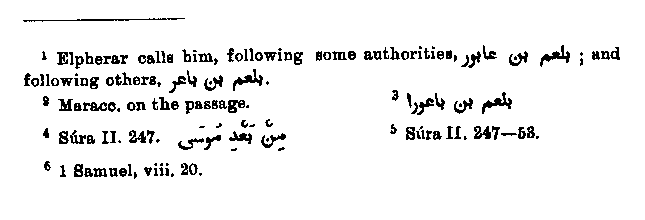
page 118
Second Part
Moses and his Time.
The history of the earlier times was preserved only in brief outlines, and was not so important either in itself, or in the influence whole, it exerted on the subsequent
ages; therefore Muhammad adopted from it only such legends as were edifying in themselves and to which he could append pious reflections. In the period of which we are now going to treat, there is certainly still a long array of legends, but historical facts are preserved for us with greater distinctness and clearer detail, and these facts are of greater religions importance. The giving of the Mosaic Law and the eventual life and noble personality of Moses himself afford Muhammad plenty of material for his narrative. Here we will first put together the whole life of Moses as represented in the various passages of the Quran, and then we will go on to consider the details to be commented upon. Among the oppressive enactments of Pharaoh against the children of Israel was an order that their children should be thrown into the water. Moses1 the son of Amram2 was laid by his mother in an ark; Pharaoh's wife, who saw the child there, saved it from death and had it nursed by its mother. When Moses was grown up he tried to help his oppressed brethren, and once killed an Egyptian; the next day however he was reminded by an Israelite of his yesterday's deed. This made him afraid, and by the advice of a friend he fled to Midian,3 and married there the daughter of a Midianite.4 When he wished to leave Midian he saw a burning bush, approached it, and received a command to go to Egypt to warn Pharaoh5 and to perform some miracles to make him believe; he asked for his brother Aaron as an assistant in this work.6 He obeyed the command and accomplished his mission, but Pharaoh remained unbelieving and assembled his magicians, who

indeed imitated the wonders, but were so far surpassed by Moses and Aaron that they themselves became believers in spite of the threats of Pharaoh.1 But a mighty judgment overtook Pharaoh and his people, who remained stubborn in their unbelief; and at last the Egyptians were drowned in the sea, while the Israelites were saved.2 Nothing is related of the journey of the children of Israel before the giving of the Law, except the striking of the rock with the staff so that water flowed out, and this comes in only incidentally in two passages;3 in the former of which however other facts about the stay in the wilderness are related. Moses then received the Law,4 and prayed to see God's glory.5 During his absence the6

Israelites made the golden calf, which Moses on his return dashed into pieces and gave to the Israelites to drink;1 and after that he appointed seventy men.2 Later on he sent spies to Canaan, but they all except two were godless. The people let themselves be deceived by them and in consequence were obliged to wander for forty years in the wilderness.3 Further, Moses had a dispute with Korah, whom the earth swallowed up,4 and he was wrongly accused.
This last statement may be either a reference to the matter of Korah, or to the dispute with Aaron and Miriam. These are the main events of Moses's life as they are given in the Quran, and we have arranged them partly according to the order of their mention in that book, but more with reference to our better source. Besides all this, a wonderful journey which Moses is said to have taken with his servant5 is given, about which we shall speak further on. To pass on now to details. Haman6
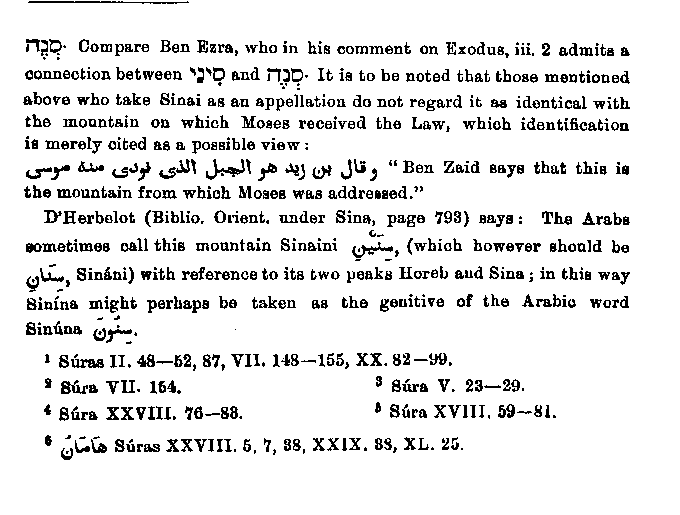
and Korah1 are mentioned as counselors of Pharaoh and persecutors of the Israelites. The latter is alluded to in this capacity by the Rabbis,2 who say "Korah was the chief steward over Pharaoh's house." As to the former, Muhammad must at gone time have heard him mentioned as the Jew's enemy,3 and therefore have put him in here, although later Arabians do not thus designate the Haman4 who lived in the time of Ahasuerus. The Rabbis also say a good deal about Pharaoh's advisers, amongst whom they sometimes mention Balaam, Job and Jethro. Of these the first agreed with Pharaoh and for this reason he was afterwards killed by the Israelites; the second remained silent, therefore he had to endure sufferings; the third fled, and so the happiness of being the father-in-law of Moses fell to his lot. The two chief magicians,5 who are also mentioned in a letter of the apostle Paul, are specially named as abettors. Fear on account of some dream6 is given as the greatest cause of persecution; and this is in accord with the statement of the Rabbis that it was foretold to Pharaoh by the magicians7, that a boy would be born who would lead the Israelites out of Egypt; then he thought, if all male children were thrown into the river, this one would be thrown with them.8 The finding

of Moses is attributed to Pharaoh's wife,1 and she is mentioned as a believer,2 evidently having been confounded with Pharaoh's daughter, by whom Moses was found according to the Scriptures,3 and in the same way the name4 given to Pharaoh's wife by the commentators is a corruption of the name5 by which his daughter was known among the Jews. The words of the Bible "Shall I go and call thee a nurse of the Hebrew women?"6 give rise to the following Rabbinical fable:7 "Why must the nurse be a Hebrew women?" This shows that he refused the breast of all the Egyptian women. For God said "Shall the month that is one day to speak with me suck an unclean thing?"8 According to Muhammad Moses regarded his slaying of the Egyptian as sinful and repented thereof,9 which is contrary to the Jewish view,10 expressed as follows; "The verse in the 24th Psalm (according to the reading of the Kethibh; 'Who took not away his soul out of vanity') refers to the soul of the Egyptian, which Moses did not take away, until he had investigated his case judicially and had found that he deserved death." That the Hebrew whom he released strove again on the following day with an Egyptian,11 and that he betrayed Moses, because he would not uphold him, but on the contrary reproved him

for his quarrelsome temper is mere embellishment, as is also the very happy invention of a man who warned Moses to flee.1 There is a mistake to be found in the very brief account of Moses' flight to Midian and his residence there, for Muhammad speaks of two2 instead of seven3 daughters of the Midianite. Instead of letting the vision in the bush be the occasion of Moses' leaving Midian, as it is in the Bible,4 Muhammad erroneously makes out that Moses had formed the resolution to leave the country before this event, and that the vision appeared to him on the way.5 The appearance of Moses before Pharaoh is connected in a remarkable way with the divine commission to the former. So closely are the two circumstances bound together that in many places Pharaoh's answer follows immediately upon God's command, without its having first been mentioned that Moses and Aaron had gone in obedience to God to Egypt, had done wonders before Pharaoh and had admonished him. But on the other hand in those passages where only the admonitions given by Moses to Pharaoh are related, without the preceding events being given, the part elsewhere omitted is of course supplied but as we might expect with changes. Pharaoh is said to have reproached Moses with the murder of the Egyptian.6 This is a very simple invention, which however is contrary to the literal sense of the Scriptures,7 unless we accept the Rabbinical explanation8 of the words, "the king of Egypt died,"9 that is, "he became leprous and a leper is as one dead; "and also of the words, "for all are died who sought
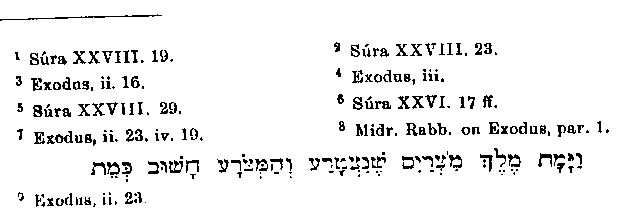
thy life"1 which is as follows: "Were they dead? They were Dathan and Abiram, who were involved in the dispute of Korah. This only means that they had become powerless."* Further, Moses is supposed to have shown the sign of his leprous hand before Pharaoh,2 which is not mentioned in Scripture,3 but which agrees with the following statement in the Rabbinical writings4 "He put his hand into his bosom, and drew it out as white as snow from leprosy they also put their hands into their bosoms and drew them out as white as snow from leprosy." The magicians who were summoned asked at first, in distinction from God's messengers, for their reward5; but when they had seen their serpents swallowed by that of Moses they believed, praised God and were not intimidated by Pharaoh's threats. This is quite contrary to the Bible, in which such a confession is found only after the plague of lice,6 and there too only in the form of a mere hint. Among Moses' own people only his own tribe is said to have believed on him,7 and the Rabbis say8 that "the tribe of

Levi was exempt from hard labour." Pharaoh himself was also a magician, and this he claims, according to my opinion, in his address to the other magicians.1 This is in accord with the Rabbinical statement2 that the Pharaoh who lived in the days of Moses was a great magician. In other passages of the Quran,3 Pharaoh claims for himself divinity which assumption no doubt is intended to be accepted by the people. This trait is also developed in Jewish legend,4 where we read: "Pharaoh said to them 'From the first have ye spoken an untruth, for lord of the world am I, I created myself and the Nile; as it is written:5 my river is mine own and I have made it for myself.'" In another passage6 Muhammad puts the following words into Pharaoh's mouth: "Is not the kingdom of Egypt mine and these rivers which flow beneath me?" Elpherar, with others,7 remarks on the words "beneath me?" that they mean "by my command." A quite new but charming fiction is that of a pious Egyptian, who warned his countrymen not to despise the teaching of Moses and not to persecute him.8 Certain features of this story sound familiar. For instance, the words in verse 29: "If he be a liar, on him will the punishment of his falsehood light; but if he speaketh the truth, but some of those judgments with which he threateneth you will fall upon you," bear a resemblance to the words of
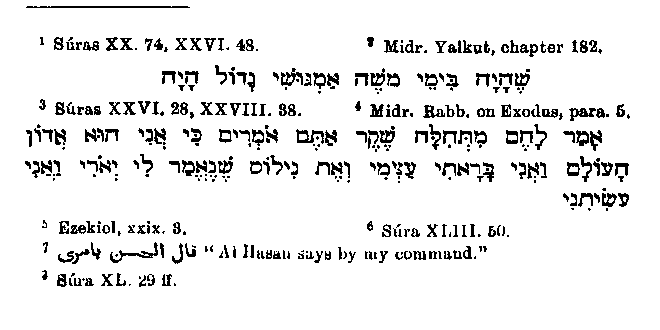
Gamaliel in the New Testament. The allusion to Joseph in verse 86 is found in a very dissimilar Jewish tradition, as follows:1 "If Joseph had not been, we should rot be alive." Muhammad is not clear about the plagues. In some passages2 he speaks of nine plagues. In another passage2 he enumerates five, which stand in the following order: Flood, Locusts, Lice, Frogs and Blood. Although we cannot here find fault with the want of order in the plagues and with the omission of some of them since Muhammad here is not, any more than is the Psalmist,4 to be considered as a strict historian, get the mistaken inclusion of a flood, which is not to be confounded with the overthrow in the sea,5 may fairly be considered as a proof of the want of reliable information on the subject. The fear of the Israelites6 at the approach of the Egyptians by the sea is also mentioned by Muhammad.7
Now we come to a circumstance, which is also taken from Jewish legend, but which has been almost entirely misunderstood, from ignorance of its origin. The passages may be translated as follows: "And we caused the children of Israel to pass through the sea, and Pharaoh and his army followed them in a violent and hostile manner, until when he was drowning, he said: 'I believe that there is no God but He on Whom the Children of Israel believe, and I am now one of the resigned;' on which God said, (or perhaps this is to be read in the first person, so that this verse too expresses Pharaoh's penitence, and the next verse begins the expression of God's answer) 'Thou hast been hitherto one of the rebellious and wicked doers. This

day, however will we save thee with thy body, that thou mayest be a sign to those who shall be after thee.'"1 This is the quite simple meaning of the words, which has been turned and twisted about by others, because they were ignorant of the following Jewish legend:2 "Recognize the power of repentance Pharaoh King of Egypt rebelled excessively against the Most High saying: 'Who is God that I should hearken to His voice?'3 but with the same tongue he repented saying: 'Who is like Thee, O Lord, among the Gods?'4 God delivered him from the dead, for it is written: 'For now I had put forth my hand and

smitten thee,1 but God let him live to proclaim His power and might, even as it is written in Exodus, ix. 16."
On the occasion of the striking of the Rock Muhammad makes twelve streams gush out, so that each individual tribe2 had its own particular stream. Apparently this is a confusion of the events at Raphidim, where the rock was struck,3 with those at Elim where the Israelites found twelve wells.4 On these wells the commentator Rashi, probably following earlier expositors says:5 "They found them ready for them, in number as the twelve Tribes." when it came at last to the giving of the Law, the Israelites are said to have rebelled; but God threatened them that He would overturn the mountain6 upon them if they would not accept the Law. The Jews also say that God threatened to cover them with the mountain as with a basin turned upside down.7 But now the Israelites demanded that they themselves should see God; they died at the sight of Him, but were afterwards raised again.8 The corresponding Rabbinical statement may be translated as follows:9 "The Israelites desired two things of

God, that they might see His glory and hear His voice; and both wore granted them, as it is written:1 'Behold the Lord our God hath showed us His glory and His greatness, and we have heard His voice out of the midst of the fire.' Then they had no power to bear it; for when they came to Sinai and He appeared to them, their soul departed at His speech, as it is written:2 'My soul went forth when he spake.' The Law (the Torah) however interceded with God for them saying: 'Would a king marry his daughter and slay all his household?' The whole world rejoices (on account of thy appearance), and shall thy children (the Israelites) die? At once their souls returned to them, therefore it is written:3 'The Law of the Lord is perfect, restoring the soul.'" The story of the calf is also one of those which Muhammad, following the Rabbis, has found it easy to embellish. He says that the people would have killed Aaron, if he had not made them a calf;4 and the Rabbis say:5 "Aaron saw Hur (who had wished to oppose them) killed; then he thought: if I do not listen to them they will do with me as with Hur? According to another statement of the Quran6 one, of
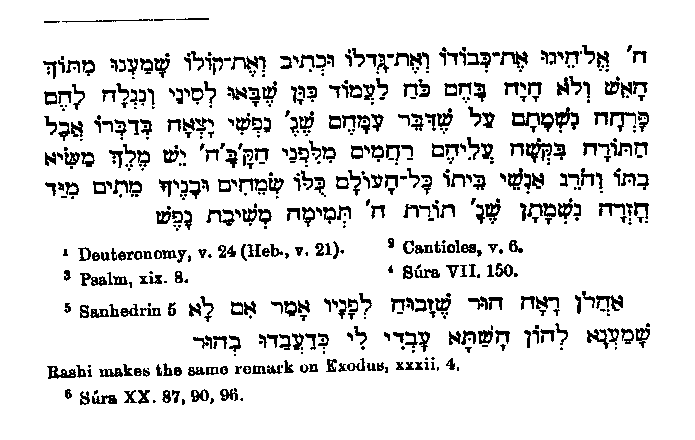
the Israelites, named Samiri,1 led them astray and also made the calf. This arose perhaps from Samael,2 the name of one who is supposed by the Jews to have been helpful at the making of the calf; but at any rate the tale has been differently developed by Muhammad. According to him this was one of the Israelites who was present, and whom Moses condemned to everlasting wandering,3 so that he was compelled to say perpetually, "Touch not."4 One recognises that this legend is composed of different elements. It is not foreign to Jewish tradition that another Israelite, not Aaron, made the calf, and according to one legend, Micah,5 who is mentioned in Judges, helped in the making;6 whence it comes that many Arabians assort that Samiri and Micah are one and the same person.7 Perhaps Muhammad formed the word Samiri from a confusion with the name Samael.
Samiri was the name for Samaritan, and according to the Arabians the Samaritans said, "Touch us not."8 With how much reason the Arabians hold this is indeed unknown, perhaps only from confusion with a sect of the Pharisees described as bad in the Talmud, where it is named "The set-apart, touch me not;"9 but I have only a dim recollection of the passage. In short the Samaritans were certainly known to later Arabians by this name, and

Muhammad doubtless knew them by it too; and since he gave the name of Samaritan1 to the maker of the calf, this man must have seemed to him to be the founder of the sect, and the "Touch me not" must have originated with him, which as a punishment was known to Muhammad from the similar story of the wandering Jew. Muhammad says that the calf lowed as it come forth.2 With this is to be compared the Rabbinical statement: "There came forth this calf3 lowing, and the Israelites saw it. Rabbi Johuda says that Samael entered into it and lowed in order to mislead Israel."4 In the Quran it is said5 that among the people of Moses there was a tribe which kept to the truth. This seems to refer to the tribe of Levi and especially to their behaviour about the calf, although possibly it may refer also to their belief in Moses's mission to Pharaoh of which we have spoken before. In the biblical account a statement is made,6 which is explained by the Rabbis as follows:7 "From Exodus, xxxii. 26, it is clear that the tribe of Levi was not implicated in the matter of the golden calf." The Arabian commentators produce the most unedifying fables about this passage.
In the events which follow abbreviations are to be found, but neither changes nor embellishments, except in the story of the dispute with Korah, which gives rise to some. Korah is said to have had such riches that a number of

strong men were required to carry the keys of his treasure-chamber,1 and the Rabbis tell us,2 "Joseph buried three treasures in Egypt, one of which became known to Korah. Riches kept by the owner to his hurt3 may be applied to the riches of Korah. The keys of Korah's treasure chamber were a burden for three hundred white mules." It is implied in the same Talmudic passage that he became overbearing and quarrelsome from the possession of such riches, and Muhammad embellishes this idea in a fine manner. One passage in the Quran may refer to this dispute, for it says there that some persons had accused Moses, but that God cleared him from the charge which they had brought against him.4 Some of the commentators also refer the passage to this event, while they bring forward the following story, which we give in Elpherar's words:5 "Abu'l-'Aliah says that it refers to the fact that Korah had hired a bad woman, who accused Moses before all the people of bad conduct with herself. God made her dumb, cleared Moses of the accusation, and destroyed Korah." This is actually supposed to have happened after Moses had made known the law about adultery, and after the enquiry as to whether it applied to him also had been answered by him in the affirmative.6 The Rabbis also allude to this in the following words7 "And when Moses

heard it, he fell on his face. What did he hear? That he was blamed for being intimate with the wife of another;" and in another passage we read:1 "Each man suspected his wife on account of Moses." Other commentators understand that the accusation was that Moses had killed Aaron, because the two were alone together when Aaron died on Mount Hor; but Moses was cleared from this by the angels, who produced Aaron's corpse.2 This is also a Rabbinical idea, for we read in the Midrash Tanchuma3: "All the congregation saw that Aaron was dead.4 When Moses and Eleazar came down from the mountain, the whole congregation came together against them asking them 'Where is Aaron?' They said: 'He is dead.' They replied: 'How can the death angel come to a man who has once resisted him and held him back? for it is written:5 He (Aaron) stood between the dead and the living and the plague was stayed. If you produce him, well; if not, we will stone you.' Moses then prayed: 'Lord of the world, clear me from this suspicion.' Then God immediately opened
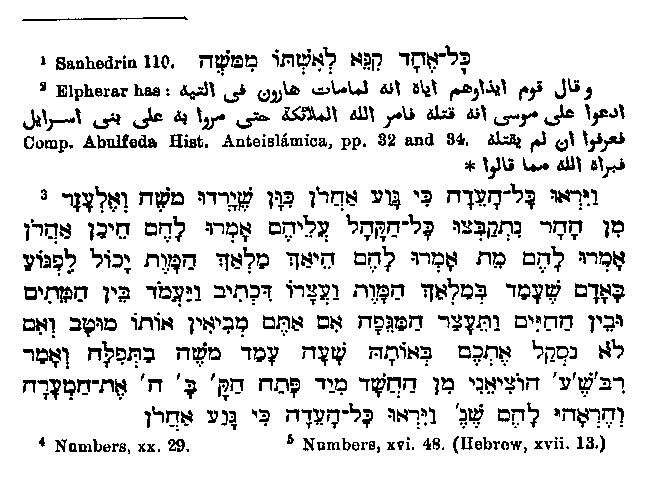
the grave and shewed Aaron to them, and to this refers the passage 'The whole congregation saw, etc.'" Here I omit entirely a third very insipid fable which the commentators mention, and which seems to them to be the most probable occasion of the verse, but I cannot trace it to any Jewish source. The most correct view is, as Wahl has already remarked, that the verse refers to the reproaches of Aaron and Miriam.1 In short the fifth verse of Sura LXI is about the answer of Moses to the disputants. Here the commentators give only the fable not quoted by us, just because here, as in the second passage, they repeat only the most universally accepted view. But this cannot prevent us from holding to our opinion. Of the journey described by Mubammad2 I could not find a trace in Jewish writings, although the colouring is Jewish.* Moses is said to have gone with his servant to see the place where two seas met, and to have forgotten a fish, which they were taking with them for food and which sprang into the sea. When they went back to seek it, a servant of God met them and made the journey with them, telling them before hand that his notions would rouse their impatience. He sank a ship, killed a youth and propped up a wall; and only when they parted did he give sufficient reasons for these actions. The story following this about Dhu'l-
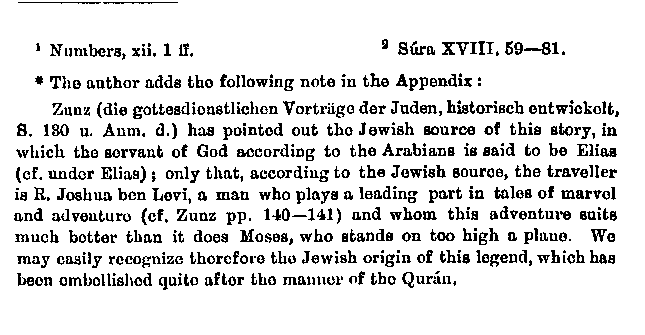
Qarnain1might well refer to Moses, the shining one,2 if anything of the sort were known about him.
Of the individual laws which are mentioned historically in the Quran,3 only one, viz that relating to the red hefer,4 affords material for a narrative, and that is given5 in very unnecessary fullness and with manifold errors. In the first place Muhammad confounds the red heifer6 with the calf which is slain for one murdered by an unknown hand,7 and he also makes the dead man live again8 on being struck with a piece of the animal. In view of such great distortions we must not deal hardly with him for the following small one; he says that the cow must be of one year,9 in contradiction to the rabbinical statement that she had to be a two-year old.10
As to those persons who come into the history of Moses, we have already disposed of Pharaoh, Aaron and Korah,11 while we have only mentioned others and therefore must add more about them. Miriam12 is praised in the scripture and called a prophetess,13 but the Rabbis value her still more highly and say of her:14 "The angel of death had no power over Miriam, but she died from the divine afflation, and therefore worms could not touch her." According to
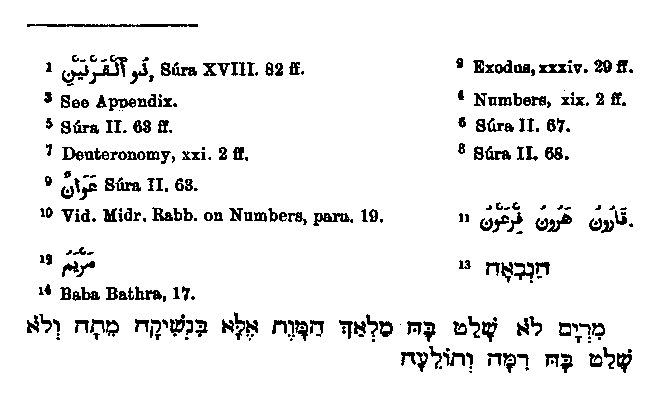
Muhammad1 Miriam is the mother of Jesus.2 Although Miriam's name is not mentioned in the passage where she is alluded to in the history of Moses3 yet there is not the slightest doubt that Muhammad took both Marys for one and the same person; for The Talmudic utterance already cited, viz., that Miriam did not die through the angel of death, could easily be turned into a statement of a long, if not endless, life for her, especially by Muhammad, who treats chronology pretty much according to his own pleasure. The other person who appears in the history of Moses is his father-in-law Jethro. Now it is true that his name, like that of Miriam, is not mentioned in the story of Moses,4 hence the Muhammadan tradition connects this Midianite (as the Quran simply designates the father-in-law of Moses) with Shu'aib, the Arabic name for Jethro, and so they came to be considered as one and the same, not however without more or less opposition. Thus Elpherar says:5 "Opinions are divided as to the name of Moses' wife’s father. Many say he was the prophet Shu'aib; others that he was Jethro the nephew of Shu'aib who died before him; others again that he was a man who believed on Shu'aib." But the most widespread tradition is that it was Shu'aib himself.
Thus Elpherar always calls him by this name, when mentioning him in connection with these events and
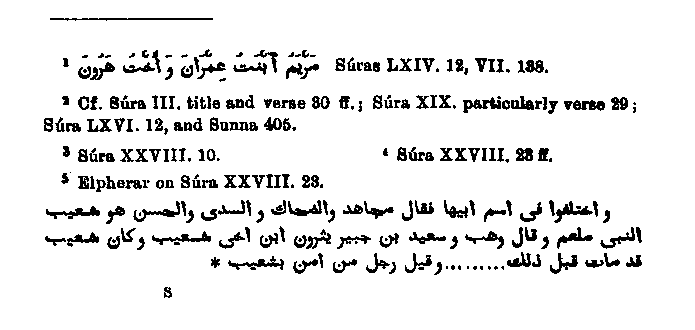
Abulfeda1 relates just this one thing about Shu'aib, viz., that he was the father-in-law of Moses, without giving any other opinion. Though his name is not mentioned in this connection in the Quran, other events independent of Moses' life are related of him, particularly his admonition of the Midianites, which is said by the Rabbis to have been the cause of the hatred of that people towards him.2 Muhammad took up the admonition without mentioning the consequence which it entailed on Jethro, viz., the driving away of his daughters which was just the circumstance which led to Jethro's connection with the life of Moses. According to Muhammad an immediate punishment fell on the Midianites.3 The Rabbis have the following on the subject:4 "The priest of Midian had seven daughters.5 God hates idolatry and did He give Moses a refuge with an idolater? Concerning this our teachers tell us: Jethro was priest of the idols, but knew their worthlessness, despised

idolatry and had thought of being converted even before Moses came. Then he called his fellow-townsmen and said to them: 'Till now I have served you, but now I am old, choose you another priest: and he gave them back the vessels of service.' Then they put him under a ban, so that no one conversed with him, no one worked for him, no one tended his flocks; and when he asked this service from the shepherds, they would not give it. The shepherds came and drove them away.1 Was it possible? Jethro was the priest of Midian and the shepherds drove away his daughters? But this shows that they had put him under a ban, and for this reason they drove his daughters away." In the mouth of the people, or more probably from Muhammad himself, the legend received the embellishment that Jethro wanted to convert his fellow-countrymen to the faith, and that they were punished on account of their unbelief. A reproach which is specially brought against them, or rather the point of the exhortation, viz., to give just weight and measure,2 must be founded on some legend or other, although I have not yet come across it in Jewish writings.3 Jethro shows himself as a preacher quite according to Muhammad's ideas. He preaches about the Last Day4 and asserts that he desires no reward;5 on the other hand his townspeople reproach him with working no miracles.6 I have presented the facts and quotations here as though there were no doubt that all these passages refer to Jethro, but exception might be taken to this. An altogether different name7 is found in the Quran, and it is not easy to
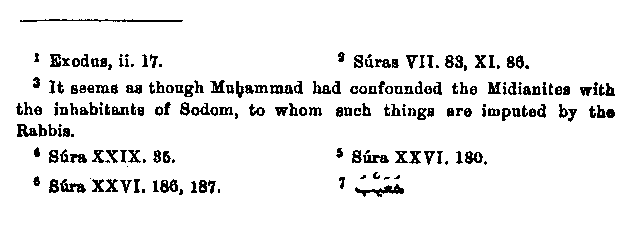
explain how Jethro came by it. However, we must first try to show that Shu'aib and Jethro are identical, and then put forward our conjectures as to how the many-named Jethro added this name to his others. The identity is first shewn by the fact that those to whom he was sent are called "Midianites;"1 in the second place, the two first passages2 give the events concerning him between the story of Lot and that of Moses.
Now if we can find among the Rabbis any intimation favourable to this supposition, then nothing important will remain to oppose its adoption3 as a probable hypothesis. Very little, however, can be adduced to show how Shu'aib and Jethro came to be one and the same person. Muhammad may have confused the name Hobab4 - often used for Jethro and probably pronounced Chobab - with Shu'aib. Perhaps an etymological explanation may be thought of here, for the Rabbis assert that the staff used later by Moses and called the divine staff5 grew in Jethro's garden.6 Now Sha'ba7 means staff and Shu'aib8 may be taken as the possessor of the staff. If Shu'aib is the same as Jethro,
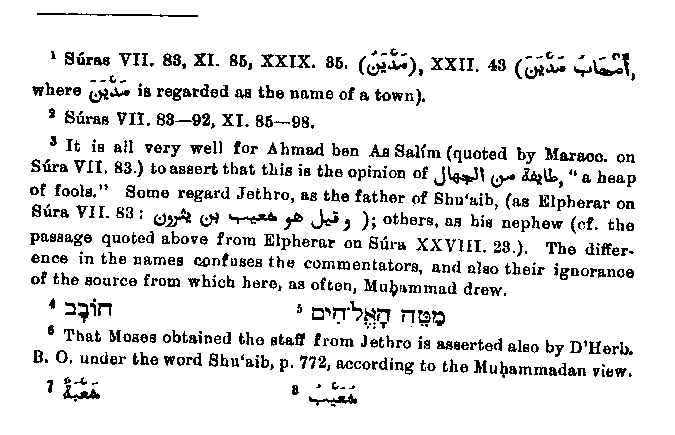
there are passages1 in which the former is mentioned, while those to whom he is sent are not called Midianites; and so we find a new name for these people,2 viz., "men of the wood," a which name is evidently derived from the thorn bushes which were in the vicinity.
It remains for us to justify the bringing forward of two more passages,4 and it is all the more difficult for us to do so, because in order to prove our point we must accuse Muhammad himself of a misunderstanding. In these passages Shu'aib is not mentioned, but the people who are held up as a warning are called "men of the well,"5 without any other particulars being given about them. But further these "men of the well"6 are mentioned in one passage along with the "men of the wood," and so it seems certain that Muhammad regarded them as two different peoples; but nevertheless we allow ourselves to believe them to be really identical.
The real reason for bringing Jethro into the Quran is, as we have already remarked, the quarrel of the shepherds with his daughters, although the fact itself is not mentioned in that book; and it is thus easy to understand that the Jews may have sometimes called the Midianites by this name, "men of the well". No other circumstances related about these persons mentioned in the Quran would authorize this appellation. The story of Jacob at the well (setting aside the fact that not the slightest allusion

to it is to be found in the Quran,) has in it no trace of hostility; and so the conjecture is not too daring that, as a matter of fact, all these three,1 viz., the Midianites, the people of the wood, and the people of the well, are the same, but that Muhammad regarded the first two only as identical and looked on the last as different. Still this tradition seems to have been received even among the Arabs, for we find in Elpherar2 among other explanations the following: Wahb says that the people of the well sat beside it (the well), and the shepherds served idols. Then God sent Shu'aib, who was to exhort them to Islam, but they remained in their error, and continued their efforts to harm Shu'aib. While they sat round the well in their dwellings the spring babbled up and gushed over them and their houses, so that they were all ruined." In like mariner Jalalu'd-din says:3 "Their prophet is called by some Shu'aib, by others differently." This admission of the Arabic commentators strengthens our opinion considerably. Another person of some importance in the Mosaic age is said by some Arabic commentators to be alluded to in the Quran,4 but many others dispute the allusion. Elpherar quotes four different opinions on this passage. The first opinion is that it refers to Balaam, for which he quotes many authorities, and relates the history of Balaam in almost complete accord with the
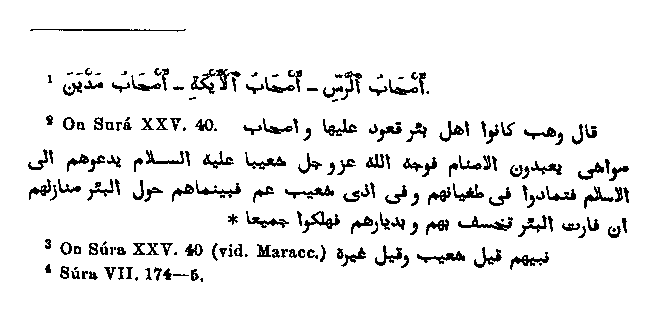
Bible narrative.1 Jalalu'd-din and Zamakhshari2 refer this to Balaam, and call him Balaam the son of Ba'ura3. Beyond these no other persons who come into the life of Moses, or who were important in his time, are mentioned, and thus our second part comes to an end.
